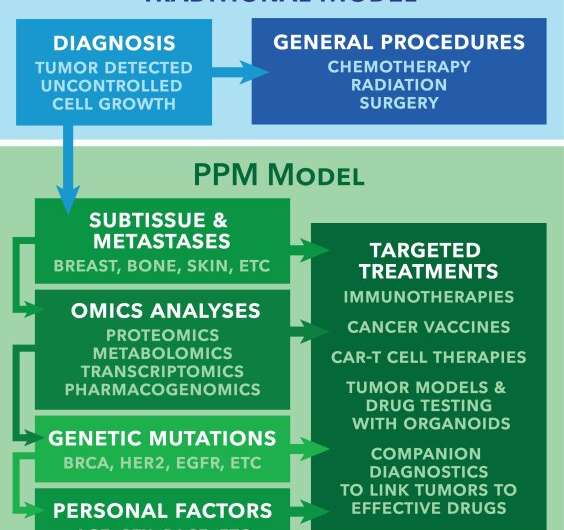The growing role of precision and personalized medicine for cancer treatment

In a paper published in the September/December 2018 issue of Technology, a group of researchers from Rutgers University Department of Biomedicine Engineering have published a review paper on the transformative potential of precision and personalized medicine (PPM) for cancer treatment.
A group of Rutgers Ph.D. fellows and faculty published a review paper on the transformative potential of precision and personalized medicine (PPM) for cancer treatment. Their analysis considers the entire process from acquiring PPM data, to developing a PPM product, and addresses broader economic and societal consequences. This review paper is the culminating achievement of a cohort of 12 Ph.D. student fellows at Rutgers University. Professor Martin Yarmush served as the Program director and principal investigator.
The paper reports that PPM has the potential to transform cancer care (see image). The traditional model is limited to tumor detection, followed by general treatment procedures such as surgery, chemotherapy, and radiation. In contrast, the PPM approach allows for targeted treatments, which are more effective and avoid unnecessary side effects. These treatments are identified by analyzing specific tissues, gene mutations, and personal factors relevant to each unique case of cancer. Examples of such emerging treatments include immunotherapies, cancer vaccines, companion diagnostics, and more.
In addition, the authors addressed societal issues of PPM in healthcare. Although potentially transformative, a lot of difficult questions must be answered before PPM becomes part of standard cancer care. These include regulatory challenges, economic concerns and feasibility, and associated socioeconomic and privacy issues. Today, PPM technology exists and is rapidly becoming more efficient and sophisticated; however, these questions must be tackled in order to allow for the smooth integration of PPM into cancer care.
More information: Paulina Krzyszczyk et al, The growing role of precision and personalized medicine for cancer treatment, Technology (2019). DOI: 10.1142/S2339547818300020

















